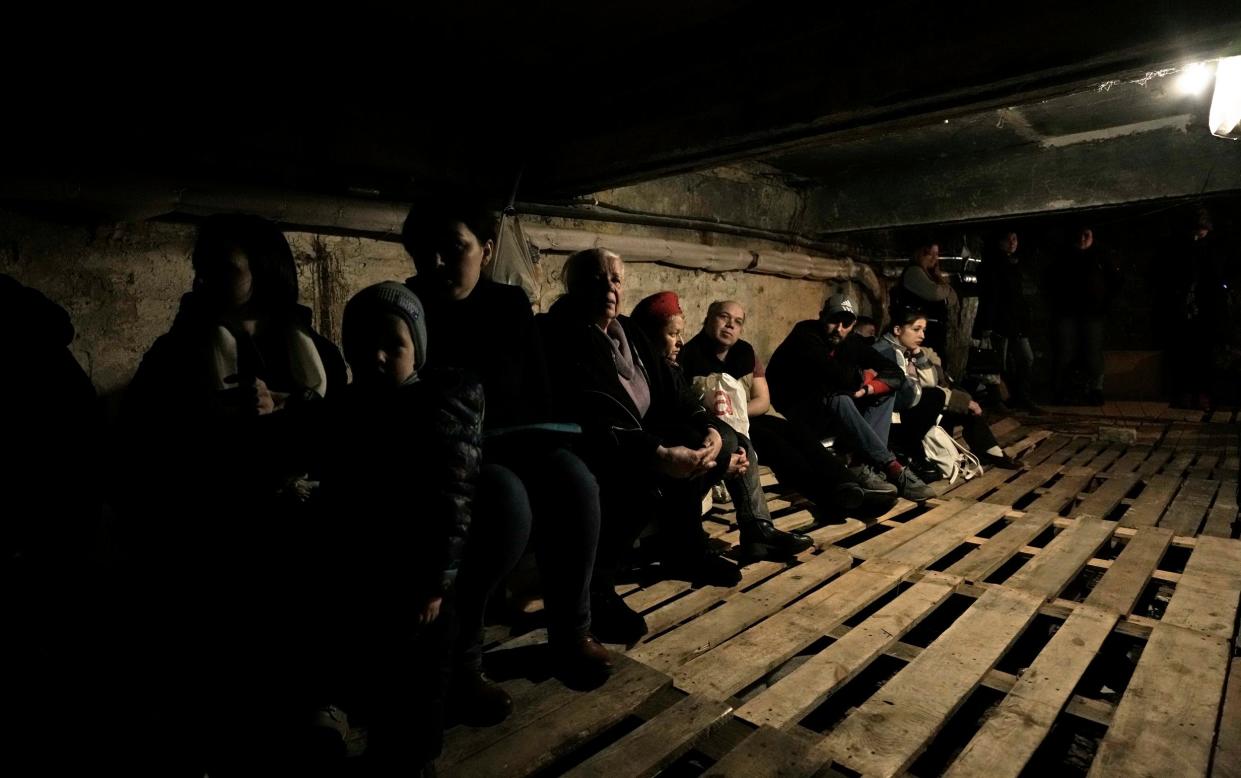Ukraine morning briefing: Five developments as MoD says northern battlefield remains largely static

- Oops!Something went wrong.Please try again later.
As Joe Biden appeared to call for regime change in Russia - saying Vladimir Putin “cannot remain in power” in a highly charged speech in Warsaw - the White House put out a corrective to say no, the US wasn’t seeking regime change in Moscow. The US President had somehow been mistaken.
Meanwhile, in an interview with The Telegraph, Liz Truss, the Foreign Secretary, set out a blueprint for the so-called "off ramp" that the Russian president could be offered to halt his assault on Ukraine.
Here's what happened overnight.
1. Man detained on suspicion of espionage in Lviv
The governor of the Lviv region said a man was detained on suspicion of espionage at the site of one of the two rocket attacks that rattled the city on Saturday.
Maksym Kozytsky said police found the man had recorded a rocket flying towards the target and striking it.
Police also found on his telephone photos of checkpoints in the region, which Mr Kozytsky said had been sent to two Russian telephone numbers.
Rockets hit an oil storage facility and an unspecified industrial facility, wounding at least five people.
A thick plume of smoke and towering flames could be seen on Lviv's outskirts hours after the attacks.
2. Ukraine's fuel and food storage targeted in attacks
Russia has started destroying Ukrainian fuel and food storage depots, meaning the Government will have to disperse the stocks of both in the near future, Ukrainian Interior Ministry adviser Vadym Denysenko said on Sunday.
Speaking on local television, Mr Denysenko said Russia was bringing forces to the Ukrainian border on rotation, and could make new attempts to advance in its invasion of Ukraine.
3. Russia preferring indiscriminate use of bombardments
Britain's Ministry of Defence (MoD) said Russia continues to besiege a number of major Ukrainian cities including Kharkiv, Chernihiv and Mariupol.
A daily update said Russian forces were proving reluctant to engage in large-scale urban infantry operations, rather preferring to rely on the indiscriminate use of air and artillery bombardments in an attempt to demoralise defending forces.
The assessment said it was likely Russia would continue to use its heavy firepower on urban areas as it looks to limit its own already considerable losses, at the cost of further civilian casualties.
Latest Defence Intelligence update on the situation in Ukraine - 27 March 2022
Find out more about the UK government's response: https://t.co/ckHIvT4Jyu
🇺🇦 #StandWithUkraine 🇺🇦 pic.twitter.com/GXZaD2yqCL— Ministry of Defence 🇬🇧 (@DefenceHQ) March 27, 2022
"The battlefield across northern Ukraine remains largely static with local Ukrainian counterattacks hampering Russian attempts to reorganise their forces," MoD said.
"Russian forces appear to be concentrating their effort to attempt the encirclement of Ukrainian forces directly facing the separatist regions in the east of the country, advancing from the direction of Kharkiv in the north and Mariupol in the south."
4. Russian billionaire's aircraft detained 'indefinitely'
Britain has seized two jet aircraft belonging to Russian billionaire Eugene Shvidler as Western governments seeking to end the war in Ukraine put pressure on Russian president Vladimir Putin by targeting the luxury lifestyles of his closest supporters.
Treasury Secretary Grant Shapps said on Saturday that the two aircraft would be detained "indefinitely" after a three-week investigation that had already grounded the planes. The Times reported the aircraft as a $45 million Bombardier Global 6500 and a $13 million Cessna Citation Latitude.
"Putin's friends who made millions out of his regime will not enjoy luxuries whilst innocent people die," Mr Shapps said on Twitter.
The UK froze Mr Shvidler's UK assets last week as it announced a new round of sanctions on Russian companies and wealthy individuals.
Mr Shvidler was sanctioned because of his links to those who have backed the war in Ukraine and because he has profited from his support for the Putin regime, the UK said.
5. Finland fears Russian cyber warfare
Finland's president says his country would likely be targeted by Russian cyber warfare and could face border violations if it decides to apply for membership of Nato.
Several polls in recent weeks have shown a majority of Finns now supporting Nato membership, up from 25pc at most before the Russian invasion of Ukraine.
President Sauli Niinisto said in an interview on Saturday with public broadcaster YLE that the biggest benefit would be "gaining a preventive effect". But he pointed to a risk of disruptive behaviour by Russia during an accession process, which would take at least months.
He said an application would lead to tensions at Finland's 1,340km (830-mile) border with Russia, including the possibility of "robust" border and territorial violations - not just by Russian aircraft, as Finland has experienced in the past.
Mr Niinisto said: "We don't even know all the possibilities for hybrid influencing that someone may invent. The entire world of information technology is vulnerable. Even some important society functions can be disrupted."
Moscow has said it would consider that European Union members Finland and neighbouring Sweden joining Nato a hostile move that would have serious military and political repercussions.

